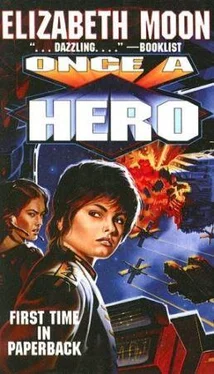Elizabeth Moon - Once a Hero
Здесь есть возможность читать онлайн «Elizabeth Moon - Once a Hero» весь текст электронной книги совершенно бесплатно (целиком полную версию без сокращений). В некоторых случаях можно слушать аудио, скачать через торрент в формате fb2 и присутствует краткое содержание. Жанр: Космическая фантастика, Боевая фантастика, на английском языке. Описание произведения, (предисловие) а так же отзывы посетителей доступны на портале библиотеки ЛибКат.
- Название:Once a Hero
- Автор:
- Жанр:
- Год:неизвестен
- ISBN:нет данных
- Рейтинг книги:3 / 5. Голосов: 1
-
Избранное:Добавить в избранное
- Отзывы:
-
Ваша оценка:
- 60
- 1
- 2
- 3
- 4
- 5
Once a Hero: краткое содержание, описание и аннотация
Предлагаем к чтению аннотацию, описание, краткое содержание или предисловие (зависит от того, что написал сам автор книги «Once a Hero»). Если вы не нашли необходимую информацию о книге — напишите в комментариях, мы постараемся отыскать её.
Once a Hero — читать онлайн бесплатно полную книгу (весь текст) целиком
Ниже представлен текст книги, разбитый по страницам. Система сохранения места последней прочитанной страницы, позволяет с удобством читать онлайн бесплатно книгу «Once a Hero», без необходимости каждый раз заново искать на чём Вы остановились. Поставьте закладку, и сможете в любой момент перейти на страницу, на которой закончили чтение.
Интервал:
Закладка:
According to the chronometer, she had slept a solid seven hours. She could try for another short nap . . . but experience suggested that she wouldn’t really sleep. Better would be a shower—it was late third shift on this ship—and an early start on the working day.
No one was in the big shower room; she let the hot water warm her and wash away the fear-stink. As she came back down the passage, she heard someone’s alarm go off. Not hers—she had carefully shut hers off. Then, from down the passage, another alarm. She made it into her compartment before those alarms stopped, and when she emerged, it was to find two bleary-eyed ensigns on their way to the showers, and a jig leaning on the bulkhead folding down the top flap of his uniform boot.
“Sir!” they all said, coming to more or less upright posture. Esmay nodded, feeling the momentary glow of virtue that accompanies an early rising, clean teeth, and the evidence that one’s associates are still half-asleep.
She did not let herself dwell on that. She had work to do—not only learning the ship, as Major Pitak had said, but figuring out why the major’s data cube and the ship’s records were so different. All that day, except for hurried meals, Esmay mapped the real ship against two dissimilar records. Major Pitak’s data cube was right except once, far in the bow end of T-1, Deck Thirteen, when neither fit the reality. A hatch had disappeared completely, replaced by a bulkhead painted in garish stripes. As Esmay stood there, wondering what the pattern meant, a bald senior chief bustled out of the nearest cross-passage, and hurried toward her.
“What are you—oh, excuse me, sir. Can I help you find something?”
Esmay had not missed the tension . . . something was clearly going on. But it was not yet her job to find it. She smiled instead. “I’m Lieutenant Suiza,” she said. “Major Pitak told me to familiarize myself with the entire ship by 0800 on the 27th, and I thought there was a hatch up here to the electronics warehouse facility.”
“Oh . . . Major Pitak,” the man said. Evidently Major Pitak was well known outside her own bailiwick. “Well, sir, the ship’s database hasn’t caught up to renovations. The electronics warehouse access is up that way.” He pointed. “I’ll be glad to show you.”
“Thanks,” Esmay said. As they turned away, she said “This bulkhead pattern—is it something they didn’t teach us, or—?”
A red flush went up the back of his neck. “It’s—probably unique to DSR ships, Lieutenant. They’re so big, you see . . . the captain’s permitted some nonreg markings to keep newbies oriented.”
“I see,” Esmay said. “Very sensible—I’ve gotten lost several times already.”
The red flush receded; she could hear relaxation in his voice. “Most people do, Lieutenant. That pattern just lets people know that what the ship’s schematics show isn’t there any more—they haven’t gone the wrong way, exactly, but the way’s changed.”
Something about the intonation of that almost put a capital letter on “way.” Esmay stowed that slight emphasis for later consideration, and followed the chief outboard, then forward again, to a hatch clearly labeled Electronics Warehouse Facility. Under that official label was another.
Esmay thanked her guide, and went in. It looked like any storage facility she’d seen, as large as most on major bases. Racks of containers labeled with part numbers; bins with the most commonly needed parts piled loosely. A jig she had not met yet came out from a warren of racks.
“Sher, is that you—oh, sorry, sir.” Esmay went through her explanation again, introducing herself to Jig Forrest. He seemed eager enough to show her the whole warehouse.
“I just wondered—my ship schematic showed a different entrance.”
“Before my time,” he said. “I know—I got lost trying to find this place when they sent me up from the 14th. We share this warehouse with Training—those technical schools people are always needing more parts in the lab. That’s why they moved this warehouse. I don’t think they update the ship’s schematics often enough, especially since this is a DSR—it’s important for us to know where we are. But you know how it is, Lieutenant: no one asks jigs for their opinion.”
Esmay grinned. “I do indeed. And I suspect, new as my extra bar is, that no one asks lieutenants their opinion either.” At least not until the middle of a mutiny, when everyone else was dead. But this fresh-faced young man with the coppery hair hadn’t been through that.
“You must be with Major Pitak,” he said now, and at her expression laughed again. “She always sends her new juniors out to find impossible corners of the ship. I’ve never been in H&A, for which I thank whatever gods govern the assignments.”
“At least I know where this is now,” Esmay said. “And I’d better get back to my list.”
She was glad for the years of open-country navigation on the estancia . . . she had no problem retracing her route down and aft, and arrived in the junior officers’ section in plenty of time to freshen up before taking her assigned table at mess. Now that she was wide awake, she found it easier to engage them in conversation.
Callison, the senior jig, had a graduate degree in environmental engineering. Partrade, the junior jig, worked in administration—a specialty still called paper-pushing, though relatively little of it was on paper. The five ensigns at her table included one in Hull and Architecture, two in Weapons Systems, and one each in Medical Support and Data Systems.
Esmay wondered if any of them had served aboard a ship in combat, but didn’t like to ask. She had spooked them enough the previous night. Partrade brought the topic up without her having to ask.
“Was the Xavier action your only experience in combat, Lieutenant Suiza?”
Esmay managed not to choke on her peas. “Yes, it was.” End of sentence.
“I’ve never even served on a warship,” Partrade went on, with a glance around. “I don’t think anyone at this table has. They put me in Maintenance Administration right away, and I’ve been on the Kos for five solid years.”
“I was on Checkmate ,” one of the ensigns said. “But we never did anything but patrol.”
“Be grateful,” said Esmay, before she could stop herself. Now they all stared at her. She hated this. She felt too young and too old at the same time.
“If the lieutenant doesn’t want to talk about it, don’t push her.” That from the lieutenant at the next table, whom Esmay now remembered was the one she’d met outside the lift tube. “Dinner’s not the time for gory stories anyway.” He winked at Esmay. She grinned in spite of herself.
“He’s right,” she said to her table. “It’s not a fit topic at the table.” Or among strangers, she realized. Now she understood why the veterans tended to cluster apart to tell their tales, why they had fallen silent when she and other juniors had tried to overhear them. “Any of the rest of you have any experience?” She was surprised to hear in her own voice the same slight emphasis to the word which she had heard from more senior, and experienced officers. Their heads shook. “Well,” she said. “Then we won’t be tempted to bring up things like that at dinner.” Her smile would, she hoped, take the sting out of that. “Now . . . Zintner, you’re in H&A. Was that your intent at the Academy?”
“Yes, sir.” Zintner, who must have stood on tiptoe to make the minimum height requirement, almost sparkled in her seat. “My family’s been in shipbuilding forever—a long time anyway. I wanted to work on military hulls . . . that’s where the good new stuff is.”
“And this is your first assignment?”
Читать дальшеИнтервал:
Закладка:
Похожие книги на «Once a Hero»
Представляем Вашему вниманию похожие книги на «Once a Hero» списком для выбора. Мы отобрали схожую по названию и смыслу литературу в надежде предоставить читателям больше вариантов отыскать новые, интересные, ещё непрочитанные произведения.
Обсуждение, отзывы о книге «Once a Hero» и просто собственные мнения читателей. Оставьте ваши комментарии, напишите, что Вы думаете о произведении, его смысле или главных героях. Укажите что конкретно понравилось, а что нет, и почему Вы так считаете.












